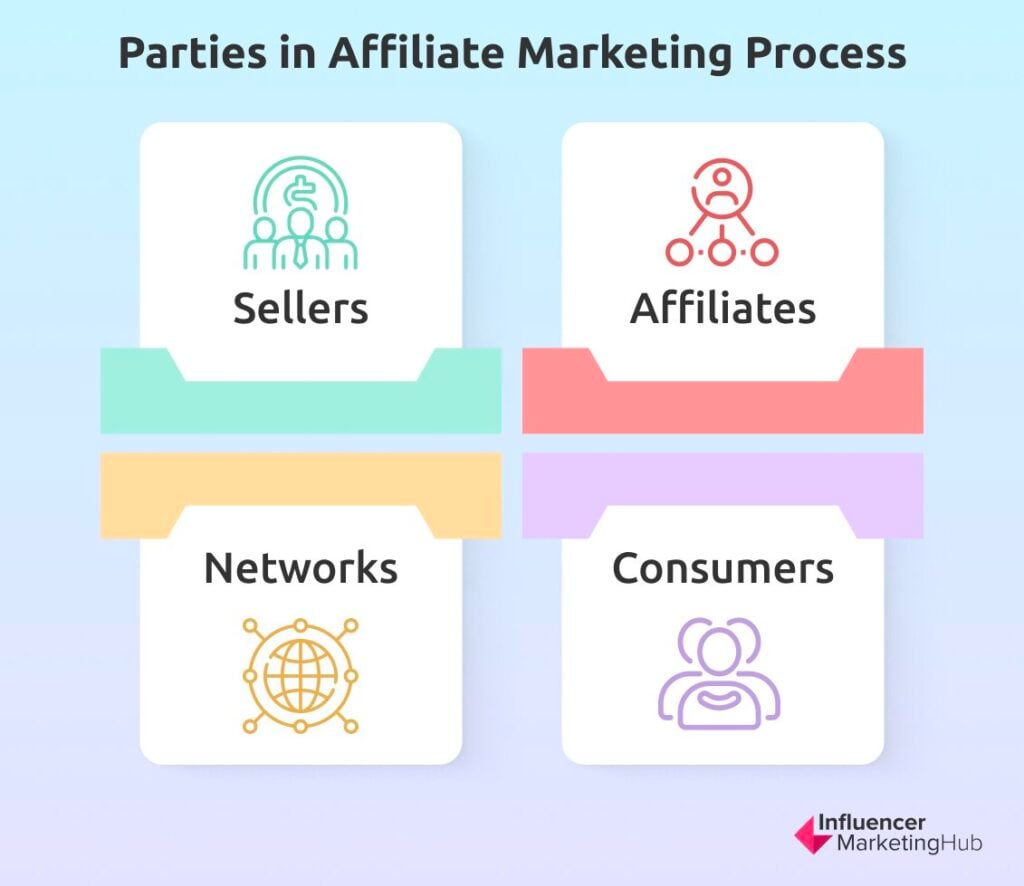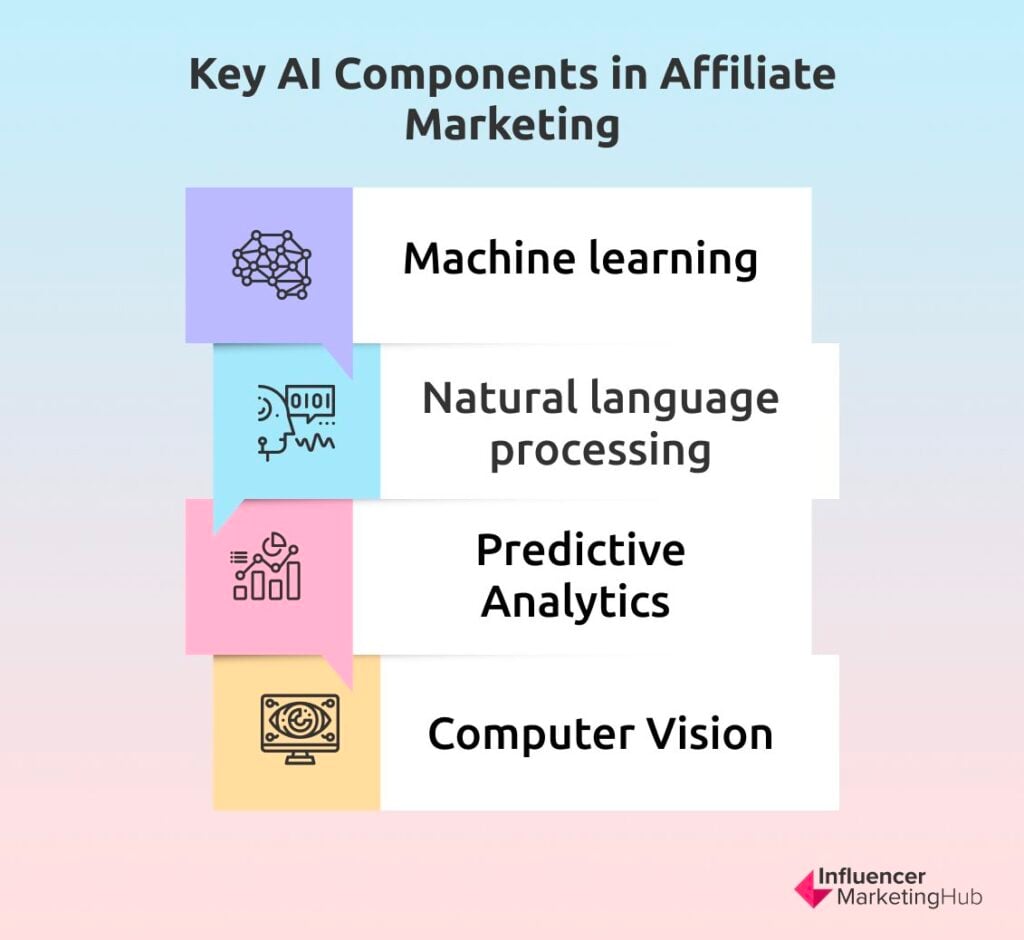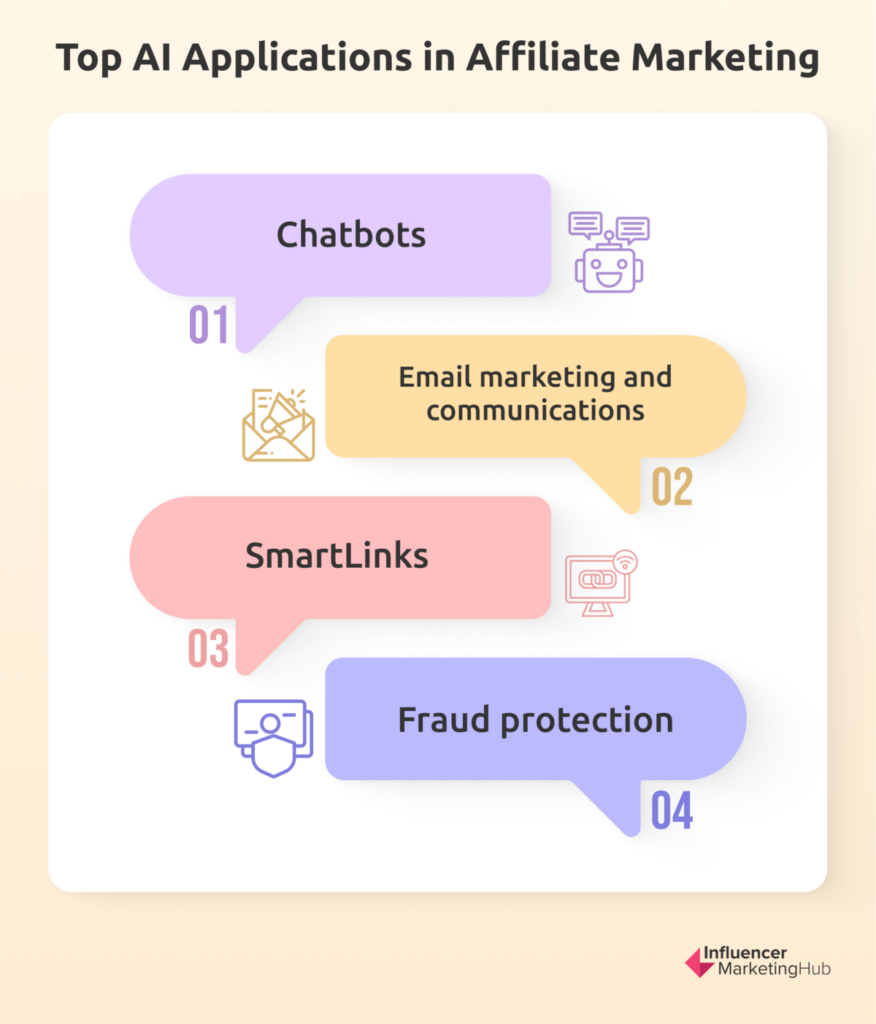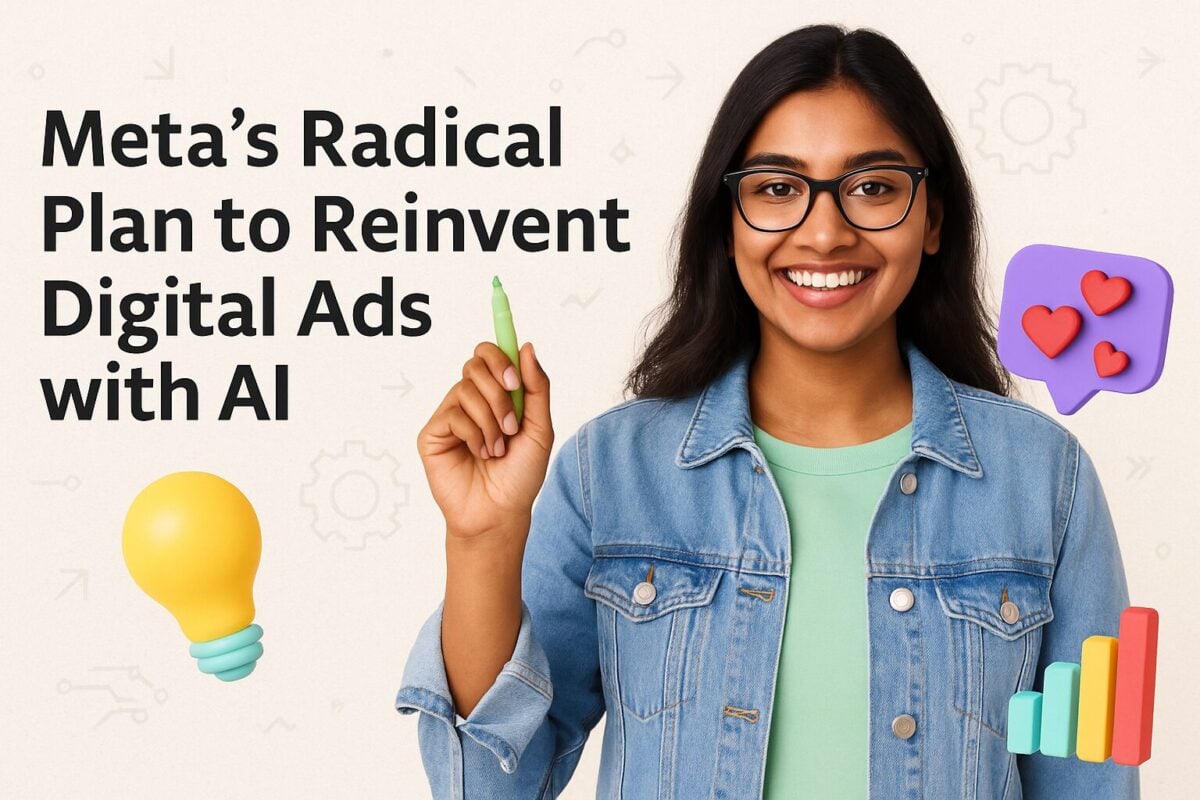We recently evaluated examples of marketing automation software. While these tools cover all types of online marketing, Upfluence offer ways affiliate marketers can use AI to automate their marketing activities.
However, don’t feel that your options are limited to those two products. In this article, we are going to examine how you can use AI to automate affiliate marketing, even if you merely want to dip your toe in the proverbial water before going deeper into AI usage.
And don’t ignore AI if you’re a business operating an affiliate marketing program, working with affiliate partners, either. You can use software incorporating AI to automate your side of the affiliate marketing process, too.
How to Use AI to Automate Affiliate Marketing:
Quick Recap of the Affiliate Marketing Process
If you’re already involved in affiliate marketing, you will already understand how the process works and can feel free to jump to the next section. However, for newcomers to affiliate marketing, we include a brief overview here. For a more in-depth introduction, take a look at our Ultimate Guide to Affiliate Marketing.
Affiliate marketing involves promoting and selling another company's products or services for a commission. There are typically three (sometimes four) parties to the process:

- Sellers: the businesses who create or supply the products being sold. They can range from gigantic companies like Amazon to one-person creators who perhaps offer a course or sell a single product.
- Affiliates: the people who promote the products. They can be individuals or businesses. They are often influencers and content creators in a niche relevant to the products.
- (Optionally) Networks: specialist companies who manage affiliates on behalf of sellers.
- Consumers: end-users of the products
Sellers either create (or purchase for resale) goods or services, who have decided that they wish to use the affiliate marketing system to sell at least some of these goods. They either set up an affiliate marketing program or sign up with an existing affiliate marketing network to add their products to their catalog. Sellers with an affiliate marketing program, or networks if sellers have chosen to partner with them, then build a team of affiliates to promote and market their products, giving each affiliate a personalized code. Consumers will see an affiliate’s marketing activities, following through the customized links to an eCommerce site/landing page, where they can purchase the products. The sellers (or networks) will in turn pay an agreed percentage of any sales revenue to the relevant affiliate as a commission for generating sales.
As you can see, there are quite a few steps involved for all of the parties, and the sellers, affiliates, and networks can all benefit from using AI to automate their affiliate marketing activities.
The Power of AI in Affiliate Marketing
In our Marketer’s Guide to AI Advertising, we clarified that there is a difference between AI and marketing automation, although they have similar aims and can work together. The key difference between the two terms is that marketing automation relies on pre-defined rules-based algorithms to train software to perform tasks without human intervention, whereas AI tools don’t just automate tasks; they learn how to do things better. AI can perform tasks that typically require human intelligence, for example, speech recognition, decision-making, and natural language processing.
The difference between the two types of tools can be fine at times. For example, you can use both traditional marketing automation and AI for activities such as automating repetitive tasks, optimizing SEO, and data analysis. The difference comes down to whether there is any learning occurring, or whether your software merely follows pre-set rules.
It’s this ability to learn that demonstrates the power of AI when you automate your affiliate marketing. You (or your software developer) don’t have to imagine every possibility in advance and add them to your software’s programming.
By using AI, the various stakeholders in affiliate marketing can save time and other resources. The AI can take care of the tedious, repetitive processes, leaving staff to do the types of activities that humans are best at. You can focus more on strategic and forward-thinking activities, as well as creativity.
Ai works particularly well at analyzing data. It can be a vital part of your affiliate marketing reporting process, determining the success of your campaigns (if you’re an affiliate) or campaigns of your affiliates (if you’re a seller or network).
Ways You Can Use AI in Affiliate Marketing
There are four main components to AI tools, all of which have applications in affiliate marketing:

1. Machine learning
The AI learns and adapts based on data, improving its performance over time as a result. For example, if you’re an affiliate using Google Ads to promote products, you can use AI to determine which ads perform best and adapt future ads to be similar to your most successful ads. An affiliate marketing network could use machine learning to deliver a personalized service to both its affiliate and seller clients.
2. Natural language processing (NLP)
This helps AI to “understand” human language. For example, quite a few tools now incorporate NLP that can produce content like blog posts, product description pages, and even social posts. By combining NLP with machine learning, AI ensures that this content will improve over time. For a while, Google discouraged using AI to produce content. However, they are currently trialing Google Search Generative Experience (SGE), a generative AI tool they intend to add to their main search engine. They have announced that they no longer intend to penalize AI-generated content.
3. Predictive Analytics
AI examines historical data to make predictions for the future. For example, affiliate marketers can use predictive analytics to better understand consumer behavior, identifying patterns and insights. Sellers can use predictive analytics when they put together incentives for higher-performing affiliates.
4. Computer Vision
AI can analyze images and videos. For example, Google incorporates this in Google Photos when it organizes images by people. You can improve its performance by correcting any identification errors it makes.
Sellers, affiliates, and affiliate networks can all clearly benefit from using AI tools in their daily activities. Even consumers can benefit from AI when buying affiliate goods. For example, Amazon uses AI to put together highly relevant results pages that feature search results and offers that are of value to consumers on their site, including those who are there thanks to affiliate marketing.
If you’re doubtful about the value of AI to your affiliate marketing, you can always begin by using it for some of the more repetitive, less creative tasks, and expand later when you feel more comfortable. For example, if you’re an affiliate marketer operating a blog, you may not want to relinquish your blog writing to AI. However, you can use a tool like ChatGPT or Jasper AI to come up with a list of suggested blog topics. Once you’ve decided on a blog topic (and title), you could then use an AI tool to outline your post, leaving the actual writing to your own creative juices.
Practical Steps to Implement AI in Affiliate Marketing
With so many tools incorporating AI now, you may already be implementing AI at some level in your affiliate marketing. However, you may consider implementing AI to be a major change, in which case you should give careful thought and consideration to how you could use it in your business. As with all changes, you will want to consider whether it will be cost-effective for you to implement the AI and whether it will lead to an increased ROI.
In our review of the Best Affiliate Marketing Automation Software to Scale Your Marketing Strategy, we highlighted the four applications for AI automation we saw as being most valuable for affiliate marketing stakeholders:

1. Chatbots
Many consumers like interacting with chatbots due to their quick response and round-the-clock availability. You can easily teach chatbots to look for particular terms in a conversation and then invite users to check out your affiliate links. Chatbots can also collect information on the interests and buying behavior of customers, providing the necessary data for you to better meet their needs.
2. Email marketing and communications
An automated email marketing tool can be valuable to sellers and networks when dealing with their affiliates, and in turn, affiliates can use such a tool to communicate with leads and potential customers.
3. SmartLinks
These are generated by an AI tool that learns consumers’ wants and preferences. When somebody clicks on a SmartLink the software directs them to the most suitable offer for their needs. This means you can avoid having to create a different link for each offer
4. Fraud protection
AI-powered fraud security tools keep you ahead of ever-changing methods of fraud. While not affiliate marketing-specific, Amazon Fraud Detector automates the detection of potentially fraudulent activities online, using AI to learn new fraudulent activity. It is available for anybody (including affiliate marketers) who uses Amazon’s cloud computing platform, AWS.
You should begin by carrying out a needs assessment, establishing your existing pain points, where limited resources are currently hindering your ability to make the most out of affiliate marketing activities. Research the various AI tools available and determine which might be viable for your business. Determine, preferably in order, a priority list of changes you would like to make.
Some affiliate marketing automation tools are all-encompassing, in the sense that they provide solutions for a wide range of problems faced by affiliate marketers (or suppliers or networks). Examples of this include the major affiliate/influencer marketing platform, Upfluence, alongside specialist affiliate marketing solutions, like PartnerStack.
Other tools focus on one or two specialist tasks, for example, Jasper.ai, which specializes in helping you create written content using AI. The latest version of the software in the Adobe Creative Cloud, e.g., Adobe Photoshop, Adobe Illustrator, and the new Adobe Firefly, offers AI capabilities to budding artists. Even if you’re simply a creator wanting to earn some money through affiliate marketing on the side, you can now use the AI-enhanced Adobe Express to make social media graphics for your posts. If you wish to dip your toe into the AI-enhanced water with chatbots, we’ve recommended 12 Messenger Chatbots to Make Engagement Easy. Most of these could be of use to affiliate marketers trying to communicate with leads, or suppliers/affiliate networks trying to improve their communications with both existing and potential affiliates.
Best Practices and Considerations
Ideally, you should begin by trialing AI in one or two of the use cases we’ve suggested, rather than trying to adapt it to your entire business in one go. Decide on what you want from AI and look for suitable tools that incorporate it. Ideally, you should test a few tools offering to improve your focus use case, to see which produces the best results for your needs.
You will need to collect data relating to your area of focus before your tests, and then compare each tool after a predetermined period of use. Which tool, if any, has produced the best results for your needs?
Some tools and platforms have relatively wide-ranging AI capabilities. It is better to focus only on parts of the tool at any time, rather than trying to evaluate the tool from a global perspective. You may find that it helps your marketing in some ways but is less successful for your needs in others.
Some of the best practices you should look for when evaluating AI software for affiliate marketing purposes include:
- Look for evidence that the AI software in question is learning over time and adapting its output. Otherwise, the automation software might as well be rules-based and non-intelligent.
- Endeavor to use the best possible data as input for the AI tool. The adage “Garbage in Garbage Out” is just as relevant to modern AI as it was to 1950s supercomputers.
- Don’t rely on AI over human expertise in all situations. As good as AI is, it is not yet completely a replacement for human creativity.
- Remember to follow any ethical considerations. For example, Google’s upcoming AI takes information from up to four sources and repurposes it as Google’s preferred answer. Some creators have queried the ethics of Google using their content in its answers. Similarly, AI use in Hollywood has become one of the hot issues in the recent writers’ and actors’ strikes. Some people have expressed concern that AI algorithms perpetuate existing biases and stereotypes. Also, you will need to ensure that you are complying with relevant data protection laws when supplying training data to the AI.
Wrapping Things Up
Remember, that AI will not always be ideal for your needs. Every business is different. A particular AI tool that your competitors swear by may be confusing and unwieldy to you, simply because you have different needs.
AI is changing rapidly at the moment. The introduction of ChatGPT was a watershed moment for many industries, including affiliate marketing, and with Google soon to incorporate AI in its search engine it will soon be part of everyday activity for most people.
Automation is perhaps at its best when it’s saving you time and money. It is excellent for all those annoying repetitive tasks you have to get through each day and those jobs that you don’t enjoy doing. AI takes automation to another level because it learns and improves every time you operate it and doesn’t just rely on pre-programmed rules.


